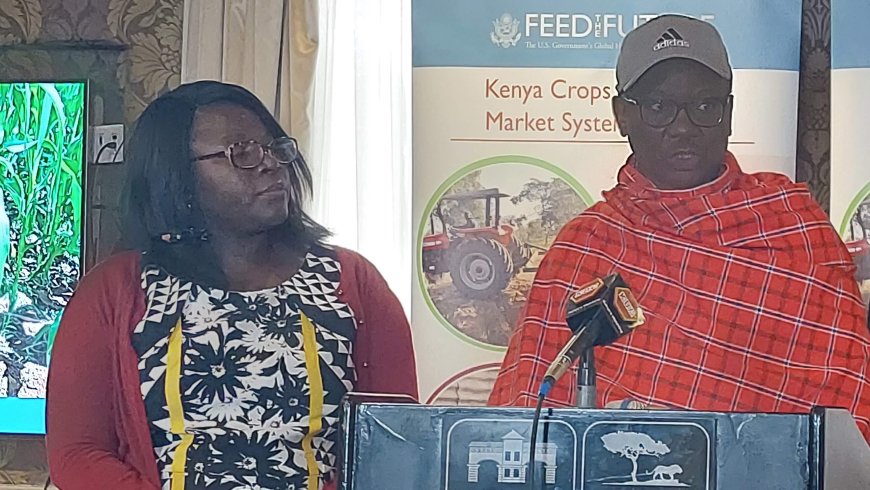Farmers trained, and able to access markets in the agriculture value chain

Kiambu,
Wednesday July 19, 2023
KNA by Wangari Ndirangu
Over 300,000 farmers in 12 Counties in the country have been able to access markets in Agriculture value chains which include Dairy and Horticulture.
The Kenya Crops and Dairy Market Systems (KCDMS) project has been working in the country for the last five years and has also been able to reach over 150,000 children under two years and caregivers with Nutrition interventions.
The Project, an activity of USAID, has been implementing various programmes in order to not only increase production and reduce poverty and malnutrition but also to improve agriculture market systems.
Speaking Tuesday during a media breakfast Dr Robert Mwadime, Chief of the Party (CoP) in the project said that having started in 2017 and ended in October last year, the project has not only assisted in the reduction of poverty for smallholder farmers but has also improved food insecurity.
He said that they have been working with the Counties, and also the private sector to be able to reach farmers, work with them and also co-funding together with the country to address the main challenges at production and also markets.
“We have for the last five years been dealing with different value chain avocado, mango, dairy, banana, passion fruits and also any other activities in production that would benefit the farmers in the region specifically nine counties from the Western area and three from Eastern Kenya,” he said.
Dr. Mwadime explained that when it comes to production, farmers normally have very few options to generate income on what they produce and the best thing therefore is to help them not only in production but also producing for a market which is one of their biggest challenge.
“We can help farmers produce more but not having a market is a challenge and therefore in order for them to invest in production they have been assured of a market that pays and also one that is consistent,” he said
Dr Mwadime said KCDMS has been able to identify markets that require bigger volumes and gave an example of avocado fruit whose 90 per cent has been produced in central but through the programme has now been introduced in the Western region.
“With climate change now the volumes of avocados in the central are not increasing, the land is constrained, using old trees has also seen production go down. So finding a way to increase productivity through opening up of new region such as the Western counties which has land and good soils presents an opportunity for producing even more avocados of export quality,” he said
Dr Mwadime, however, noted that in order for production to rise, the project has ensured farmers have quality seeds adding County governments are supporting farmers in getting quality seeds as well as working with the private sector such as the RTI International who created a seedling site to ensure production of over 100,000 seedlings for easy access by farmers.
“We are incentivizing farmers by giving them subsidies funded by the USAID to buy seedlings and increase their avocado trees from 10 to even 50 trees to not only improve income but attract companies that would buy from their region through organized farmer groups,” Mwadime said.
Judith Odongo, Deputy CoP said KCDMS has gone further in supporting local private investors that work with vulnerable smallholder households to mitigate the effects of the UKRAINE war.
KCDMS has received a nine-month (December 2022 to November 2023) cost extension from Additional Ukraine Supplemental Appropriations Act (AUSAA) to address the macroeconomic effects of the Ukrainian invasion on the vulnerable communities in the 12 Counties.
“We have been working with agro-dealers to incentivize farmers to procure fertilizer, lime, and also soil test services in order to promote and support their production,” she said.
She explained that the promotion of climate-smart technologies around soil and water conservation through dip tillage technology which requires them to open up soil where they will plant and leave the other space untouched has seen farmers reap big.
“Using the tiller that goes deeper a little bit, has enabled the farmer to actually see better produce and crop from what they would have done if they did conventional plowing which exposes soil and nutrients leaving very little for the crop to grasp,” she said.
Odongo further explained that the project has been promoting and supporting the production, processing, and marketing of seeds of drought-tolerant crops and that they have been working with KEPHIS and KALRO in the seed space.
“We have one cooperative in Taita Taveta with which we co-invested in, a seed processing plant that enables them to process seeds, package and market,” she said.
Julius Okoth, an Agro-dealer in Siaya County said KCDMS project which he has been working for had assisted him in reaching farmers in his county through distributing subsidized fertilizer.
“National and County Governments give subsidies on fertilizer but the biggest challenge for farmers is distribution. Together with around 20 agro- dealers we established franchises and were able to distribute the fertilizer to over 10,000 farmers,” he further explained.
He noted that the UKRAINE war and the high cost of fertilizer affected farmers in the whole country but the KCDMS partnership program cushioned many farmers as they were able to go through franchising, get the fertilizers at subsidized prices and even incentives such as two bags of maize for planting free.
The KCDMS has been working through 22 grant partners, 2 local implementing partners, and the 12 county governments namely Kitui, Makueni, Taita Taveta, Homabay, Migori, Kisii, Kisumu, Siaya, Kakamega, Bungoma, Busia, and Vihiga.
The agriculture sector is the backbone of the Kenyan economy contributing approximately 33 percent of Kenyans’ Gross Domestic Product, but producers continue to face constraints that limit growth and perpetuate food insecurity.
Courtesy K.N.A
What's Your Reaction?



































































































































































































































































































